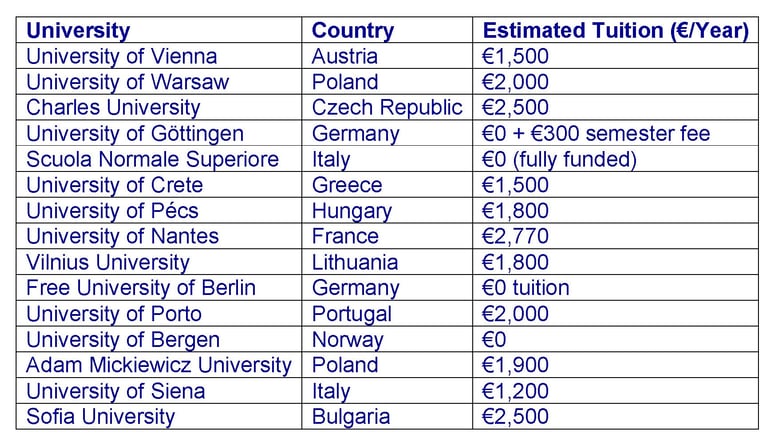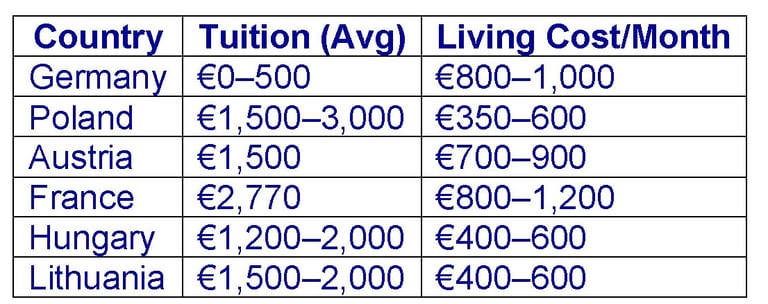✉ shreeconsultancyjsb@gmail.com ✆ Ph. No.: +91 78781-47589 , +91 97828-06464

How Cheapest Universities in Europe for International Students 2025
Discover the cheapest universities in Europe for international students in 2025. Explore low-cost degrees, tuition-free options, and how to apply on a budget.
Europe is home to some of the most prestigious and affordable universities in the world. Many countries on the continent offer tuition-free or low-cost education to international students, especially in public institutions. With a rich cultural heritage, diverse academic offerings, and world-class faculty, Europe remains an ideal destination for quality education that doesn’t break the bank.
Factors That Affect University Costs in Europe
Tuition Fees
While some countries offer free tuition (like Germany and Norway), others have low annual fees ranging from €1,000 to €5,000. Public universities are generally more affordable than private ones.
Cost of Living
Living expenses vary by country and city. Eastern European nations like Poland and Hungary are significantly cheaper than Western counterparts like France or Germany.
Availability of Scholarships
Numerous universities and governments offer need-based, merit-based, and country-specific scholarships to help international students manage costs.
Top Countries Offering Low-Cost or Free Education
Germany
Public universities offer zero tuition fees
Pay only semester contributions (~€250/semester)
Top choices: University of Göttingen, Free University of Berlin
Norway
Free education for all, including non-EU students
Only pay student union fees (~€50–100)
Cost of living is high but worth the trade-off
Austria
Low fees for non-EU students: ~€1,500/year
Affordable cities like Graz and Vienna
Great academic reputation
Poland
Tuition ranges from €1,000–€3,000/year
Low living costs (~€300–500/month)
Universities like Warsaw and Adam Mickiewicz are popular
Hungary
Tuition starts at €1,200/year
Stipendium Hungaricum is a top scholarship program
Excellent for medical and engineering studies
France
Public universities charge ~€2,770/year for undergrad
Many scholarships available (Eiffel, Charpak)
Top universities: University of Nantes, Sorbonne
Italy
Public universities charge as low as €1,000/year
Scholarships reduce fees further
Options: University of Siena, Scuola Normale Superiore
Greece
Tuition fees ~€1,500/year
Great Mediterranean lifestyle and academic culture
Lithuania
Programs start from €1,500/year
Universities like Vilnius offer great scholarships
Top 15 Cheapest Universities in Europe (2025 Rankings)
Estimated Costs: Tuition and Living (2025)
How to Apply to Affordable European Universities
Admission Requirements
Valid passport
Academic transcripts
Language proficiency (IELTS/TOEFL)
Motivation letter/SOP
Recommendation letters (optional)
Application Deadlines
Most intakes: Fall (Sept–Oct) and Spring (Feb–Mar)
Deadlines: Jan–May (for fall intake)
Language Proficiency
English programs require IELTS/TOEFL
Some free programs (e.g., in Czech Republic) require local language proficiency
Scholarships and Grants for International Students
Erasmus+
Covers tuition, travel, and living costs for EU students & exchange programs.
DAAD (Germany)
Fully/partially funded for postgrads, especially in STEM fields.
Stipendium Hungaricum (Hungary)
Covers full tuition, monthly stipend, and housing assistance.
Eiffel Scholarship (France)
Highly competitive for Master’s and PhD students.
Tips for Studying in Europe on a Budget
1. Choose Student Housing
University dorms are cheaper (~€150–300/month)
Shared flats or hostels are affordable alternatives
2. Use Public Transport
Student passes are highly subsidized
Walk or cycle in university cities like Vienna, Krakow, and Milan
3. Work Part-Time
Most countries allow 20 hours/week
Germany, France, and Italy have student job portals
FAQs About Cheap Universities in Europe
Q1: Can I study for free in Europe as an international student?
Yes! Countries like Germany and Norway offer free tuition for all students.
Q2: Which country in Europe is the cheapest to study and live?
Poland and Hungary are among the most budget-friendly for both tuition and living.
Q3: Do cheap universities offer quality education?
Absolutely. Many low-cost public universities are globally ranked and research-oriented.
Q4: Can I get a scholarship as an international student?
Yes, many European governments and universities offer scholarships like Erasmus+ and DAAD.
Q5: Are these degrees recognized globally?
Yes. Degrees from accredited European universities are recognized worldwide.
Q6: Do I need to know the local language?
For English-taught programs, no. But learning local basics helps daily life.




